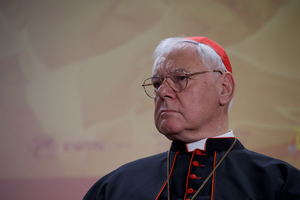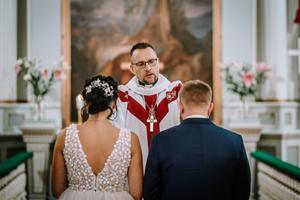Amazonian Synod’s Working Document Charts Course Through ‘Three Conversions’
The new 64-page instrumentum laboris, which will form the basis of discussion at the Oct. 6-27 synod, focuses on themes such as inculturation, ‘ecological conversion’ and synodality.

VATICAN CITY — The upcoming synod on the Amazonian region will be a time of “pastoral reflection, open to recognizing diversity” and “listening to the Amazonian reality with all its cultural and ecclesial facets,” Cardinal Lorenzo Baldisseri, the general secretary of the Synod of Bishops, told reporters at the launch of the meeting’s working document Monday.
Entitled “Amazonia, New Paths for the Church and for an Integral Ecology,” the Oct. 6-27 synod, the cardinal said, will comprise all the bishops from the vast region that encompasses Bolivia, Brazil, Ecuador, Peru, Colombia, Venezuela, French Guyana, Guyana and Surinam, along with experts, heads of relevant Curial departments and several papal appointees.
Bishop Franz-Josef Overbeck of Essen, Germany, head of the German bishops’ Latin America commission, which provides financial and pastoral support to Latin America, said in May that the synod will lead the Church to a “point of no return,” and, thereafter, “nothing will be the same as it was.”
The new 64-page working document, called an instrumentum laboris, will form the basis of discussion and focuses on themes such as inculturation, “ecological conversion” and synodality. Cardinal Baldisseri said it draws on “extensive consultation” with the help of “qualified experts.”
The text is divided into three parts: the “voice of Amazonia,” involving a presentation of current reality of life in the region; “integral ecology,” examining the Amazon’s “ecological and pastoral problems”; and, lastly, challenges and hopes of the “prophetic Church in Amazonia,” focusing on “ecological and pastoral issues” with an “Amazonian and missionary face.”
Within these sections are a number of controversial passages: It calls on bishops’ conferences with a “healthy decentralization” to “adapt the Eucharistic ritual to their cultures”; to study ordaining elders who may already have a “stable family” as priests to bring the sacraments to remote areas; and to identify an “official ministry that can be conferred on women.”
Other passages require the “teaching of Pan-Amazon indigenous theology” in “all educational institutions”; propose that “indigenous rituals and ceremonies are essential for integral health”; and invite the participants to “reconsider” the linking of Church authority with her sacramental, judicial and administrative duties, especially holy orders.
The document begins by noting that the synod must “increasingly become a privileged instrument for listening to the People of God” and draws attention to a preparatory document published last year circulated to elicit feedback from the region through questionnaires.
Emphasizing the importance of a “listening” Church “called to be ever more synodal,” the instrumentum laboris mentions in particular “the cry caused by destructive deforestation” and “extractivist activities.”
Following a proposal by the Pan-Amazon Church Network, an organization founded by bishops of the region in 2014 and headed by Cardinal Claudio Hummes, the synod’s general relator, the document says it is structured on the basis of “three conversions” invited by Pope Francis.
These comprise “pastoral conversion” that he advocated in his 2013 apostolic exhortation Evangelii Gaudium (“see-listen”); “ecological conversion” he urged in his 2015 encyclical Laudato Si (judge-act); and, lastly, the conversion of the Church to synodality detailed in his 2018 apostolic constitution Episcopalis Communio (judge-act).
‘Historic Opportunity’
The first part begins by noting the harm caused to evangelization by past colonizers, adding that the Church now has a “historic opportunity” to differentiate herself from “new colonizing powers by listening to the Amazon peoples,” presenting Christ in “all his liberating and humanizing power.”
Observing that the Amazon is “like an artery” of the world, it states that the area is “the second most vulnerable area of the planet after the Arctic when it comes to climate change caused by humans.”
It notes what the indigenous people call “good living” — living “in harmony” with oneself, nature and the “supreme being” — and stresses the region is threatened not only by environmental destruction and exploitation but also violation of human rights. It draws attention to “alcoholism, violence against women, sex work, human trafficking, loss of original culture and identity” and says “violence, chaos and corruption are rampant” in the region.
Indigenous communities, it adds, stress the link between “the threat to biological life and to spiritual life.” The document says “care for life” is opposed to “unlimited growth, the idolatry of money,” of a world detached from its roots, the environment, and of a “culture of death.”
It stresses the interconnectedness of the region, how “everything is shared,” and that indigenous people see abusing nature as “abusing one’s ancestors, brothers and sisters, creation and the Creator, and mortgaging the future.”
But it also says the Amazon is “experiencing a moment of grace, a Kairós.” The Amazonian peoples “have much to teach us,” it says, and points in particular to how, for “thousands of years,” they have taken care of their “land, water and forest.”
Elsewhere, the section underlines the challenges of migration in the region and the importance of dialogue in such a multiethnic, multicultural and multireligious region.
Integral Ecology
The second part deals with the “serious problems caused by the attacks on life in the Amazon,” an aggression towards this “vital zone of Mother Earth and its inhabitants” that threatens their “subsistence culture and spirituality.”
Integral ecology, the document says, is based on recognizing “relationality as a fundamental human category,” meaning human beings develop “on the basis of our relationships.” It adds that it’s necessary to understand justice in the context of “intergenerational communications,” including “ancestral experience, of cosmologies, of spirituality and of the theologies of indigenous peoples.”
It pinpoints challenges in saving the region from “neo-colonial degradation” and “new family formats,” such as increasing “separated families, consensual unions and assembled families, and fewer institutional marriages.” It cites Pope Francis’ 2016 apostolic exhortation Amoris Laetitia to help bring pastoral solutions to these challenges.
As well as calling for a “deepening” of knowledge of Indian theology, it asks that education also include “original myths, traditions, symbols, knowledge, rites and celebrations that include transcendent, community and ecological dimensions.” It later suggests indigenous rites that contribute to “ecological conversion” be salvaged.
“Integral conversion,” it adds, “implies recognizing personal and social complicity in the structures of sin” and “unmasking ideologies.” The document says the process of integral conversion “involves unlearning, learning and reparation.”
In a list of suggestions, the document urges criticism of “structures of sin” and ideologies that “justify ecocide” and to favor a Church “of service (not a self-referential institution)” that “cares for our common home and for the defense of people’s rights.”
‘Inculturated Evangelization’
The third part of the document focuses on “inculturated evangelization” and says evangelization in the Amazon “is a test case for the Church and society.” It states that the “preferential option for the poor” is the “hermeneutic criterion” for constructing society, adding that a “Church with an Amazonian face” has many complexities preventing “application of a monolithic body of doctrine guarded by all and leaving no room for nuance.”
As well as calling for changes in clerical celibacy to be studied and identifying women’s ministries, it also proposes more roles for women in formation and calls for opening up “new possibilities for synod processes.”
Reflective of Pope Francis’ approach, in a list of further suggestions for inculturation, it proposes discarding “rigid positions that do not take sufficient account of the concrete life of people and pastoral reality” in order to meet the “real needs of indigenous peoples and cultures.”
Also echoing Francis’ vision of the Church hierarchy as an “inverted pyramid,” it says inculturation of the faith is “not a top-down process or an external imposition, but a mutual enrichment of cultures in dialogue.”
The working document urges indigenous people to involve themselves in the mass media in the face of the media’s “colonizing invasion,” which can seduce native people into a “consumerist mentality.” And concerning the liturgy, it says it must be carried out “in an inculturated way” and that, without this, the liturgy “can be reduced to a ‘museum piece.’” At the same time, it calls for “discernment” regarding indigenous rites.
Further attention is paid to challenges in urban mission, such as “crime, drug trafficking, trafficking in human beings, prostitution.” The document also criticizes Pentecostal groups, without explicitly naming them as such, saying theologies based on fear or prosperity have a “negative impact on Amazonian groups.”
Ending on the theme of the Church’s “prophetic role” in the region, it says the Church’s mission of evangelizing “equally implies” promotion of indigenous peoples’ “rights” and “joining forces to struggle for their rights.”
It also means “seeing with a critical conscience” indigenous behavior and realities “that go against the Gospel.” The Amazon, the document states, “asks the Church to be its ally.” Associated with that is to “question power” in the region, it says.
“The Church cannot be indifferent,” it says. “It must help to protect the men and women who defend human rights and remember their martyrs, among them leaders such as Sister Dorothy Stang” — an American-born member of the Congregation of the Sisters of Notre Dame de Namur who was murdered in Anapu, Brazil, in 2005 after speaking up for the poor and the environment.
The section ends with eight activist suggestions, including joining grassroots movements, promoting human rights and “ecological awareness,” listening to the cry of “Mother Earth,” “fearlessly” adopting the “preferential option of the poor” in the struggle of indigenous peoples, and creating “networks of collaboration” so the peoples themselves “can denounce the violation of their human rights.”
The document concludes by saying that the Amazon people are calling for a “new response to the diverse challenges” and expresses the hope that the synod will be a “concrete expression of the synodality of the Church reaching outwards” so that Jesus “may reach everyone, especially the poor.”
The synod is expected to have wide significance for the Church, extending beyond the Amazon region: Pope Francis’ has called for “a Church with an Amazonian face,” while Cardinal Baldisseri said last year its proceedings will have consequences for the universal Church.
Edward Pentin is the Register’s Rome correspondent.

















